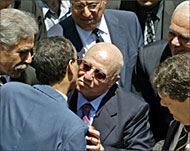Palestinian unity deal ‘expected soon’
The Palestinian ambassador to Qatar has told Aljazeera.net he expects a unification deal to be signed between the Palestinian Authority and different factions in the near future.

The Palestinian Authority is working hard to unify all resistance factions under one leadership to prevent Israel from initiating an internal Palestinian conflict, Tahseen Mikati said.
“Palestinian factions have decided to draw a red line for themselves – that is, they do not fight each other regardless of how deep the differences among them are.
“We expect to reach a compromise with the Palestinian factions, especially since nearly all of them have agreed to unify their work under one national leadership.”
Mikati said it was in the interests of the Palestinian people that armed Palestinian factions embraced the political process.
“Personally, I hope to see Palestinian factions, even those opposed to the Palestinian Authority, engaged in the political life of Palestine. They can do a wonderful job in evaluating the performance of the government, correcting its mistakes, and much more,” he said.
“We must work hard together to end the old situation when fighters from different factions fill the streets of Palestinian cities. It is not healthy at all.”
Gaza meeting
Palestinian prime minister, Ahmed Quraya, met with some resistance factions in Gaza last Saturday in an attempt to persuade them to halt their attacks against Israel. The talks involved the main armed factions – al-Aqsa Martyrs Brigades and Hamas. Quraya described the talks as “fruitful and important”.
 |
|
PM Quraya is holding intensive |
“The talks were fruitful and important. We agreed to restart national dialogue without any conditions,” he told reporters after the meeting.
However, Hamas, one of the main Palestinian factions, vowed to continue its armed resistance despite Israel’s promise to pull out of Gaza next year.
Senior Hamas official Mahmud al-Zahar said his movement would not make any promises of calm after the implementation of Israeli PM Ariel Sharon’s plan to unilaterally withdraw from the Gaza Strip.
“We cannot give Sharon any guarantee because his plan to withdraw is one-sided,” al-Zahar told reporters after the meeting, a statement that did not rule out some kind of an agreement with the PA though.
“We will continue dialogue both in the Palestinian territories and outside, with the Arab countries,” he added.
Possible solution
Yasir Arafat and the PLO fell out with some Palestinian resistance groups and Arab countries after the signing of the 1993 Oslo Accords.
The Authority was accused of accepting partial solutions to the Palestine dispute and of betraying the sacrifices of thousands of Arabs.
|
|
“We accepted a partial solution because it was our only possible choice, but that does not mean we are going to relinquish our rights in Palestine,” Mikati said.
Mikati accused western powers of using the September 11 attacks on the US as a pretext to crush Arab and Muslim aspirations in the Middle East.
“If the Oslo Accord had been implemented, we would have gained a lot. It was not our final goal, but at least it would have given us sovereignty, state, the whole Gaza, 92% of the West Bank, water, and security. But as usual Israel violated the deal.”
Heroic symbol
Mikati said the Palestinians’ refusal to give up yet more ground is the reason for the continuing isolation of Palestinian president Yasir Arafat.
|
“Palestinian factions have decided to draw a red line for themselves – Tahseen Mikati, Palestinian Ambassador to Qatar |
Arafat remains under virtual siege in his partly bulldozed headquarters in Ram Allah.
“They do not want Arafat simply because he refused to sign a final solution. They want a solution that grants them Jerusalem, the thing which Arafat has strongly refused.
“They are looking for a Palestinian leader who will give them Jerusalem, but they always forget that this city is not the property of any Palestinian leader. It is owned by Palestinians,” the ambassador said.
“President Arafat is aware of this fact. He told Clinton in one of his visits to the US, that if he signed on Jerusalem according to your views, his people would kill me as soon as I stepped off the plane.”
For the moment it remains in Israel’s interests to keep him alive.
“They do not kill him to prevent him from being an heroic symbol. It is very easy for them, but the consequences would be beyond their control. It would intensify the Arab-Israeli conflict, and the popular reaction would be overwhelming.”